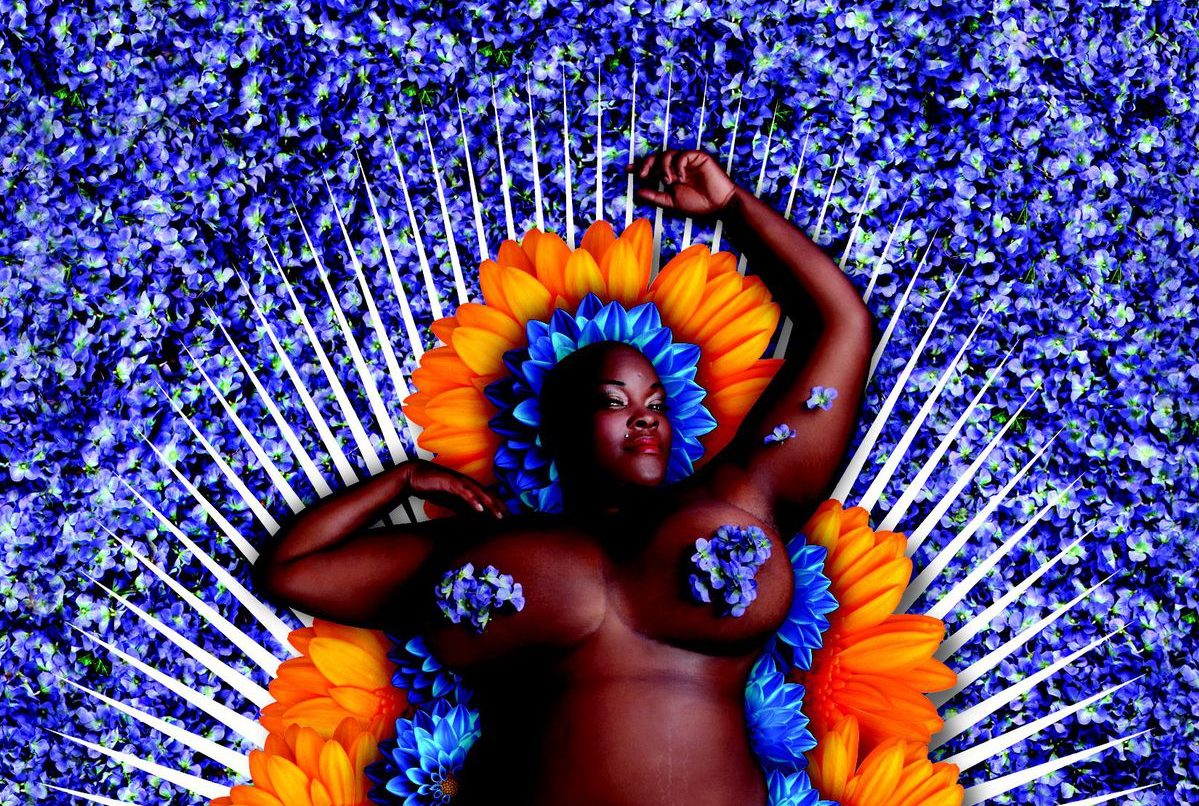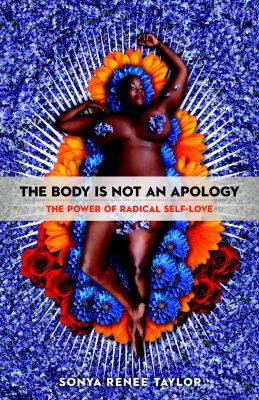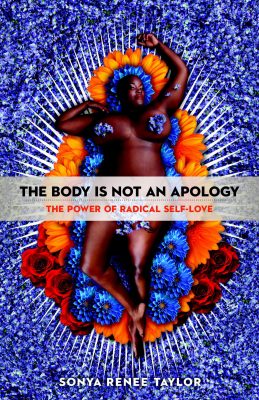
Radical self-love, that feeling of embracing your body as is, seems to be for the physically perfect, the perennially youthful. One week you compare the width of your thighs to the sylphs of Vogue and Glamour. Days later, you decide to maximize your maximus because every Instagram trainer is preaching the gospel of slow squats. And in a month you will finally buy that anti-aging crème which costs the same as your light bill.
In The Body Is Not An Apology: The Power of Radical Self-Love, author and body image activist, Sonya Renee Taylor outlines the insidious nature of self-hate and showcases its relationship to social and political ills. It’s not everyday you pick up a self-help book with a naked, gorgeous, fat, dark-skinned and bald-headed, black woman lying down amidst a circle of technicolor flowers. Taylor’s body displays the very identities that are so often disregarded in the body positive movement, especially as this cultural phenomenon has become more mainstream. The body positivity movement barely deviates from Eurocentric ideals. The majority of those said to be “revolutionizing” the idea of beauty, and thus acquiring the lion share of media attention and revenue, are models (Ashley Graham, Iskra Lawrence, Tess Holiday), and sometimes writers and activists (Jes Baker and Lindy West) who are all able-bodied white women. Seeing a black woman not only occupy, but lead within the body positive/radical self-love space with such stupendous knowledge, career success and a celebration of her own individual body is powerful in itself.

Taylor’s commitment to radical self-love ventures way beyond a simplistic self-esteem ethos. In Taylor’s carefully and soulfully researched worldview, self-love is what will truly save us all, for if we truly loved and respected our own bodies, we would also love and respect the bodies of those who do not look like us. In five short but info-packed chapters, readers learn the true definition of radical self-love, which has no place for hierarchy or loathing. Taylor’s definition is not a navel-gazing venture but instead “…lives beyond the flimsy ethos of individualism and operates at both the individual and systemic levels….” It is a love that takes into account the political, social, and economic realities of bodies. Readers are reminded that it is a strength, not a liability, to challenge societal messages on what constitutes a “good body” in their quest to love themselves.
The book’s five chapters have names like “Making Self-Love Radical” and “Building a Radical Self-Love Practice in an Age of Self-Loathing.” Taylor never shies away from the crucial, but all too bypassed fact, that oppression—whether it is based on one’s color, sexuality, age or gender—is ultimately rooted and acted out upon bodies—by either the beauty industrial complex or our own internalized self hatred. Her focus on “body terrorism” as opposed to the more apolitical “body hate” is a poignant example,
“Body terrorism is a hideous tower whose primary support beam is the belief that there is a hierarchy of bodies. We uphold the system by internalizing this hierarchy and using it to situate our own value and worth in the world. When our personal value is dependent on the lesser value of other bodies, radical self-love is unachievable.”
And unlike the often diaphanous #bodypositive campaigns of Twitter and Instagram, Taylor repeatedly states the complexity and hardships associated with real life radical self-love. Deep and lasting body love is a daily practice rooted in acknowledging the very systems that feed body hatred. Relying on heavy doses of social research and short personal vignettes to convey the intricacies of radical self-love; Taylor often hops between such passages within a single chapter. The second chapter opens with the story of Keisha, who suffers from traction alopecia, and then segues into hefty statistics on government regulation of bodies through censure and legality (from forcible sterilization to the low number of women governors). Keisha’s experience could only occur in a culture that prizes female compliance to beauty standards (this one being long hair) and simultaneously bars women from positions of power and influence. Taylor’s mix of the personal and political is a major positive to her message about self-love; as the majority of self-love books have difficulty integrating these two subjects effectively.
At times, the book strongly deviates from Taylor’s warm, conversational tone and begins to read more like a well-researched media paper. There is such a bounty of media literacy, beauty industry, and political statistics within each chapter that they can often overwhelm the salient personal stories within the book. Within each chapter are moments of reflection, separated from the main body of the text, entitled “Unapologetic Inquiry” and “Radical Reflection,” but these moments of “space” are so numerous that they can result in interference instead of introspection. Arranging these moments to occur less frequently would give readers time to pause and truly reflect amidst the abundance of facts presented.
While self-love needs to be rooted in a constant awareness of social realities to be truly revolutionary, the recurrent focus on theory dilutes Taylor’s very powerful message. The long quotations from socio-political tomes such as The Beauty Myth and The New Jim Crow are essential for readers to fully see the interdependence between systems of oppression and cultivating personal radical self-love. However, Taylor does such a thorough job convincing readers of this connection in just the first chapter that later chapters would benefit from personal stories and actionable tools.
Body love is a practice rooted in real-life doing. While “Your Radical Self-Love Toolkit” is the title of a section in The Body Is Not An Apology, it is also one of the shortest and least developed. Taylor does highlight the importance of actionable tools like “media fasts” (willfully abstaining from media which espouses negative body image messages) and crafting body positive mantras. But, these moments deserve further exploration. Perhaps the reader could be shown actual people engaging in these tools, their successes and their learning curves. Taylor repeatedly acknowledges that radical self-love is not a simplistic intellectual theory—it is an ever-present verb.
Radical self-love is for everyone. If you are old. If you are queer. If you are fat and disabled and hairy. Radical self-love is here for all but Taylor is never soft on the fact that the labor of self-love is often difficult; that the systems which profit from our subjugation wield much power and influence. In The Body Is Not An Apology, we gaze upon the beauty of this labor. We walk away knowing that the practice of self-love is not only freeing—it is a reality that can be ours.

Sonya Renee Taylor is the Founder and Radical Executive Officer of The Body is Not An Apology, a digital media and education company promoting radical self-love and body empowerment as the foundational tool for social justice and global transformation. Sonya’s work has been seen, heard, and read on HBO, BET, MTV, TV One, NPR, PBS, CNN, Oxygen Network, The New York Times, New York Magazine, MSNBC.com, Today.com, Huffington Post, USA Today, Vogue Australia, Shape.com, Ms. Magazine and many more. With a B.A. in Sociology and an M.S.A. in Organizational Management, Sonya continues to use her work to disrupt systems of inequity from an intersectional, radical self-love and global justice framework. For more info: https://www.sonyareneetaylor.com/

Hannah Eko is a writer, multi-media storyteller, and MFA candidate who currently resides in Pittsburgh, PA. You can find her work in B*tch and Bust magazines and on Buzzfeed. She enjoys geeking out on Wonder Woman, astrology, and the Divine Feminine. Hannah blogs at hanabonanza.com and enjoys Instagram (@hannahoeko) a little too much. You should ask her about love.







